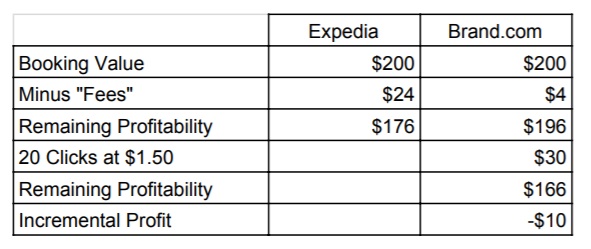
By Stephanie Smith
Buckle in kids, this is not a popular opinion.
If you had asked me my opinions about MetaSearch pre-Covid, my response would be different. If you need a tutorial on what is MetaSearch, check out this article from Milestone.
But, today, cash is tight. Budgets are being squeezed.
While I still believe in “Book Direct” and the long time value of the customer, the customer has changed. Your loyal points fanatic is not traveling. Your corporate BT is not traveling. Who is traveling? Your local customer within a 1 to 2 hour radius of your hotel.
Even if you leverage metasearch to get them to book direct on your own website, are they the type of customer to come back again and again? My answer is nope.
So, why not let the OTA have THIS customer and you focus your few dollars on getting incremental customers?
MetaSearch Focuses on Channel Shift, NOT Incrementality
My belief is that MetaSearch advertising is a channel shift from OTAs to direct.
When you participate in MetaSearch on Kayak, Google Hotel Ads, TripAdvisor or Trivago, they are already looking at your hotel. Yes, they are at the bottom of the funnel. But, it does not change your placement on any of these sites. Therefore, this is NOT incremental revenue.
On top of that, you are not saving your entire commission with that shift. You are still paying an agency fee and CPC fee. The ROAS (Return on Ad Spend) the agency gives you is ROI on the TOTAL revenue of the booking, when it should calculate the ROAS based on the profitability difference between the direct and OTA booking.
For example, let’s say a customer is on your hotel’s TripAdvisor page. So, they have already gotten past the search results and landing on the page dedicated to your hotel. Then, they decide to check rates. When you are bidding on MetaSearch, you are paying to have your own website be in first position, but all the other OTAs are still there, nipping at your heels.
A MetaSearch Scenario: OTA versus Book Direct
Let’s say, for simplicity, your hotel has an average length of stay of 2 nights with an ADR of $100.
In Scenario 1, you allow Expedia to achieve premium placement and that reservation gained you $200. Minus commission of 12%* (if you are a branded hotel) and you make $176. Note, some hotel’s negotiated rates with Expedia are higher and some are lower.
In Scenario 2, you bid in MetaSearch and your own website achieves premium placement and wins the booking instead. There is still a fee when someone books direct. It varies by hotel and brand, but let’s assume the average is 2%*. We are down to $196 for the same reservation.
What did you spend to make that $18?
Now, let’s assume you paid $1.50 for that click. But, you also need to account for other factors: conversion rate. Since not every click results in a booking, you do not convert at 100%, more likely 5%*. So, you need 20 clicks to get a conversion. You spent $30 to get that 1 booking valued at $200. With this additional data, let’s calculate our ROAS.
Calculate the ROAS for MetaSearch
Again, your ROAS is normally being calculated based on the $200 reservation, NOT the difference in money made between the channels. Your agency is going to say, we made you $200 and spent $30, therefore the ROAS is 6 to 1.
But, if you were going to get that reservation from Expedia previously, did you really make $200?
The difference in the exact same reservation on Expedia versus your own site, is $196 minus $176, which is $20 more in profitability, not incremental total revenue.
In reality, if you believe MetaSearch is only a channel shift, and your ROAS should be calculated on the $20, not the $200. So, you spent $30 to make $20. You lost money in this scenario and did not break even.
Depending on your cost per click, conversion rate, ADR, and length of stay, your numbers may be different. Do your own math!

Rate Parity and Expedia Promotions
The other elephant in the room is: Are you in rate parity? More players are active in Expedia promotions than ever before.
So, if you are playing excessively with Expedia promotions, do not participate in MetaSearch. Manually shop yourself occasionally on Kayak or Google Hotel ads if you don’t utilize tools to do so. This would be devastating to your above assumed 5% conversion rate.
Long story short, let the OTA have that booking and use your limited funds towards getting in front of audiences that are traveling higher in the funnel.
——
*Note: Cogwheel Marketing primarily works with branded hotels and data represented would more likely follow a flagged hotel over an independent hotel.

